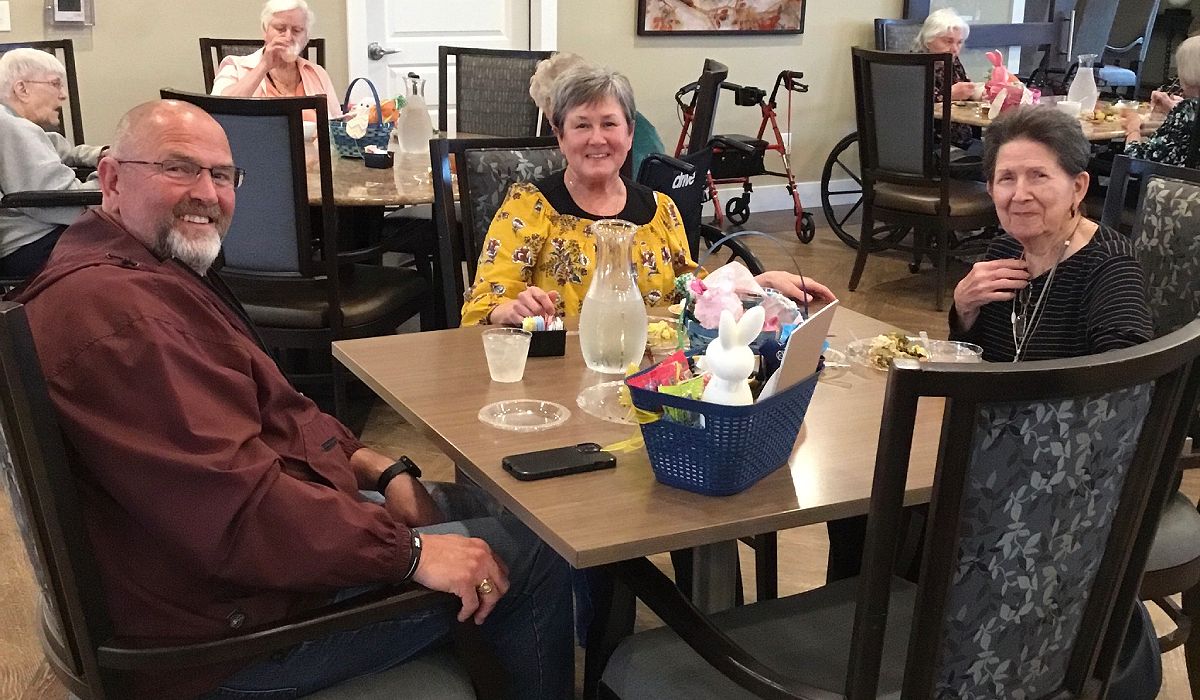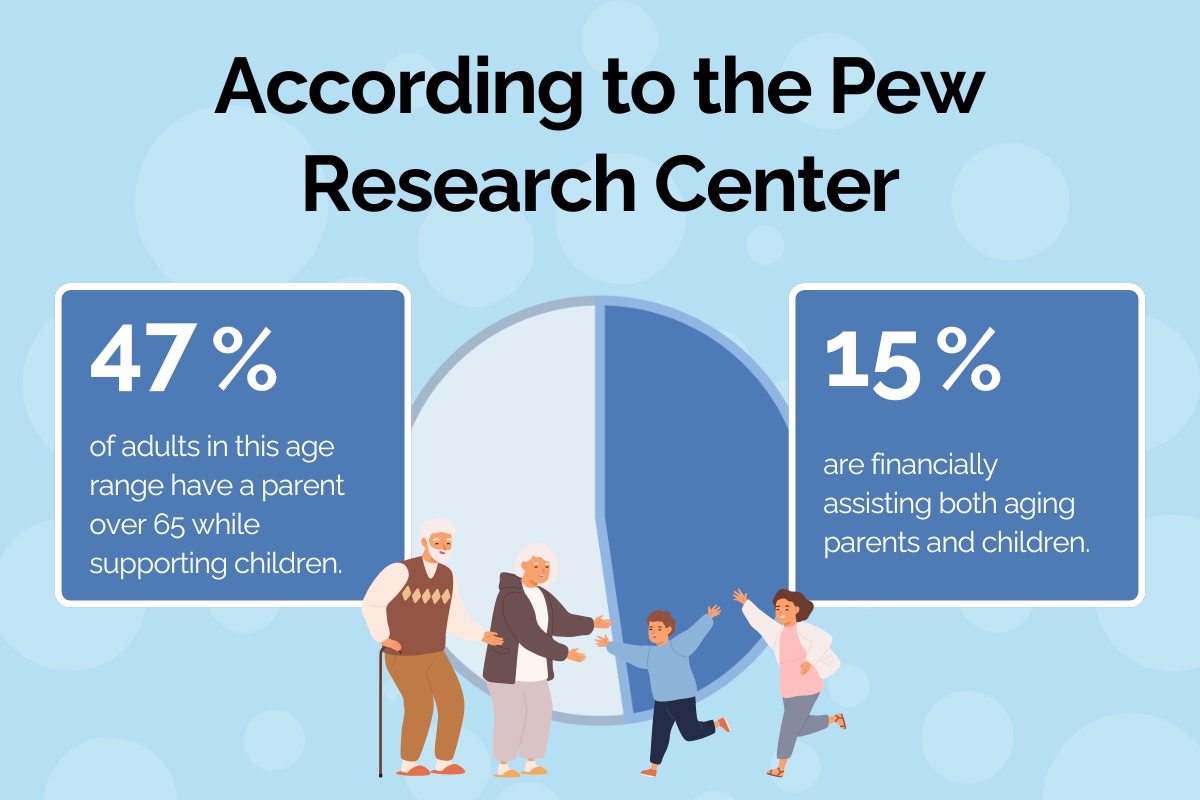As demands multiply, many adults are struggling with the challenges of caring for their elderly parents while raising their children in a complex web of responsibilities.
This group, often called the “sandwich generation,” faces special challenges that require immense dedication, patience, and support.
Even if you’re not in the sandwich generation, learning about these caregivers’ roles will help you recognize the hard work they do each day and the resources available to them.

Understanding the Sandwich Generation
The sandwich generation typically refers to middle-aged adults, typically in their 40s and 50s, who have dual caregiving roles.
According to the Pew Research Center, almost half (47%) of adults in this age range have a parent over 65 while supporting children. 15% are financially assisting both aging parents and children.
This two-fold responsibility can be overwhelming as these people strive to meet the needs of their family members on both ends of the age spectrum.
Challenges of Adult Child Caregivers Supporting Seniors and Children
Being part of this generation brings a set of difficulties that impact every aspect of life, from personal time and finances to emotional and physical well-being. Here are some of the most common issues:
- Time management: Balancing work, childcare, and eldercare can be incredibly demanding. These middle-aged caregivers have to juggle multiple schedules, attend numerous appointments, and ensure that both children and parents receive adequate attention.
- Financial strain: The costs associated with raising children, combined with the expenses of elderly care, including medical bills, assisted living, or home care, often strain household finances.
- Emotional stress: The emotional toll of caring for both children and parents can lead to burnout, stress, and even clinical depression. Someone who is caregiving as an adult child might feel guilty about not being able to give their best to either generation and may struggle with feelings of being overwhelmed.
- Personal sacrifice: Family caregivers sacrifice their hobbies, social activities, and career advancement opportunities to fulfill caregiving duties. This may lead to feelings of isolation and frustration over time.
Supporting the Sandwich Generation
Understanding the dual roles our Dallas-area sandwich generation plays, Long Creek Assisted Living and Memory Care offers valuable resources and support customized just for them.
- Professional senior care services: When the demands of caregiving become too overwhelming, Long Creek provides long-term assisted living for help with daily activities and memory care services intended for seniors with memory loss from Alzheimer’s and other forms of dementia. These ensure that aging parents receive quality care and enriching social lives while alleviating some of the pressure on their adult children.
- Support groups: Connecting with others who are in similar situations can provide immense emotional support. Long Creek can recommend support groups where adult child caregivers share their experiences, exchange suggestions, and find comfort in knowing they are not alone.
- Educational resources: Long Creek offers guidance that equips caregivers with the knowledge and skills needed to manage the complexities of caregiving. These resources include articles and face-to-face conversations with associates on elder care, financial planning, and stress management techniques.
- Childcare solutions: For caregivers juggling the needs of young children, Long Creek can propose reliable childcare services, making it easier for them to effectively manage their time and responsibilities.
The Importance of Seeking Help
Seeking help is not a sign of weakness, but a necessary step to maintaining health and wellness. By using the resources available through local organizations and communities like Long Creek, people who are caring for parents and children can find the support they need to benefit all of their loved ones.
When You’ll Know It’s Time for a Senior Care Community
Deciding when it’s time for a parent to transition to a senior care community is a challenging and emotional decision. Many families wrestle with this choice, seeking to balance their loved one’s desire for independence with their need for safety, health, and well-being. Recognizing the signs that indicate it’s time for assisted living or memory care can make this decision clearer and more manageable. They include:
- Declining health and mobility: If your loved one is experiencing frequent falls, has difficulty walking, or struggles with daily activities like bathing, dressing, and eating, it may be time to consider a senior care community. These communities provide professional medical care and assistance with daily tasks, ensuring your loved one’s health and safety.
- Chronic health conditions: Managing chronic health conditions such as diabetes, heart disease, or dementia can be increasingly challenging for seniors living alone. A community just for seniors offers specialized care and monitoring.
- Neglecting personal hygiene and home maintenance: If your loved one isn’t eating enough, is wearing dirty clothes, or is living in an untidy home, these could be signs that they are struggling to manage daily life. Senior care communities offer services that ensure personal care and living environments are well-maintained.
- Loneliness: Social isolation can have severe impacts on mental and physical health. If your loved one is no longer engaging in social activities, feels lonely, or has lost interest in hobbies, a senior care community can provide a vibrant social environment with opportunities for interaction, activities, and new friendships.
- Cognitive decline: Signs of cognitive decline, such as memory loss, confusion, and difficulty managing finances or medications, can indicate it’s time for care at a place like Long Creek. These communities offer specialized memory care programs designed to support seniors with cognitive impairments and ensure they receive appropriate supervision.
- Caregiver burnout: If you are the primary caregiver and are feeling overwhelmed, exhausted, or unable to provide the level of care your loved one needs, this is a strong indicator that it might be time to consider professional long-term care.
By joining a community and turning to their support systems, the sandwich generation can navigate their growing responsibilities with ease.
Find Comfort and Care at Long Creek
At Long Creek, we give family members the power to step back from their caregiver roles and become sons or daughters again. Embrace the balance and support your family needs by scheduling a tour today.




